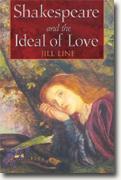Shakespeare and the Ideal of Love
Jill Line
book reviews:
· general fiction
· chick lit/romance
· sci-fi/fantasy
· graphic novels
· nonfiction
· audio books
· author interviews
· children's books @
curledupkids.com
· DVD reviews @
curledupdvd.com
newsletter
win books
buy online
links
home
for authors
& publishers
for reviewers

 |
Shakespeare and the Ideal of Love Jill Line Inner Traditions Paperback 192 pages September 2006 |
|
It's hard to imagine that any original scholarship remains to be written on Shakespeare's works, yet Jill Line has apparently found an untapped facet of his plays and sonnets: their connection to the idea of Christian-Platonism as outlined by 15th-century Italian philosopher Marsilio Ficino. This was an idea that has been widely studied in Shakespeare's contemporaries, particularly in poems, but that Line is able to trace in several of his plays and sonnets. Christian-Platonism is, of course, named after Plato, whose chief work was to "reveal the principle of unity in all things," but Ficino expanded this idea to acknowledge unity as God, adding the Christian element to Plato's teachings.
This idea is established early on in the book, and the rest of the book focuses on outlining how this idea works in various Shakespeare plays and sonnets. In “As You Like It,” for example, Rosalind is at first worshipped by Orlando for her beauty. Later on, when she assumes a male disguise, she allows Orlando to discover her greater inner beauty, her virtue and wit, in order for Orlando to see her soul, and thus, his own. This concept is similarly traced in some of his other comedies. This idea works a little differently in the tragedies. In “Romeo and Juliet,” when Romeo meets Juliet and sees both her inner and outer beauty, it is, as Line describes, much like a religious ritual. Romeo is like a pilgrim approaching a shrine, and the kiss requested from Juliet is like a blessing. He refers to Juliet as light - "Juliet is the sun" - which is, according to Line, a physical representation of the light of God. Therefore, it is finally through Juliet that Romeo knows his soul. Despite its fresh take on Shakespearean scholarship, this book made for dull reading at times. If you have only a marginal interest in Shakespeare, you may want to shy away from this book. If you are a devoted fan of the Bard, this book will make you look at his plays in a new way. While I found that Line lost me sometimes with her writing style, I appreciated how her examination of his plays made me want to read them again. Originally published on Curled Up With A Good Book at www.curledup.com. © Karyn Johnson, 2006 |
|
|
|
 Click here to learn more about this month's sponsor! |
|
| fiction · sf/f · comic books · nonfiction · audio newsletter · free book contest · buy books online review index · links · · authors & publishers reviewers |
|
| site by ELBO Computing Resources, Inc. | |
 Line plays with this idea by demonstrating how it works in various Shakespearean comedies and tragedies. According to her scholarship, Shakespeare taps into this idea of Christian-Platonism by showing that a lover's admiration of physical beauty is only earthly love, and it is only through the lover's discovery of his lady's internal beauty that the divine - unity - can be found. Since the eyes are the windows to the soul, the sparkle in the eyes of Shakespeare's heroines - what Line refers to as "Promethean Fire" - is what ultimately brings true knowledge to her lover.
Line plays with this idea by demonstrating how it works in various Shakespearean comedies and tragedies. According to her scholarship, Shakespeare taps into this idea of Christian-Platonism by showing that a lover's admiration of physical beauty is only earthly love, and it is only through the lover's discovery of his lady's internal beauty that the divine - unity - can be found. Since the eyes are the windows to the soul, the sparkle in the eyes of Shakespeare's heroines - what Line refers to as "Promethean Fire" - is what ultimately brings true knowledge to her lover.